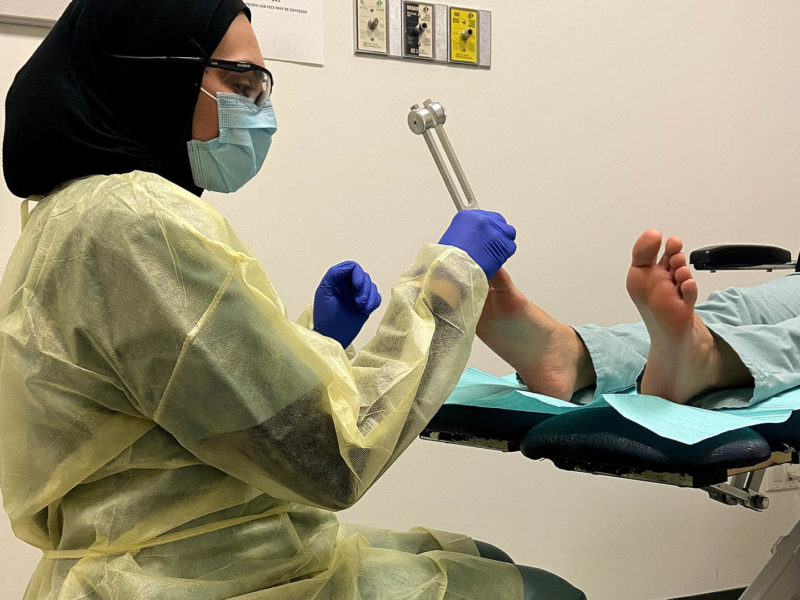Project Insights Report
Be EPIC: Dementia Training for Mid-Career Workers
 Executive Summary
Executive Summary
Over half a million Canadians live with dementia, a number expected to nearly triple by 2050. Personal support workers (PSWs), who provide direct formal care to persons living with dementia (PLWD), are often under-trained on how to respond to the complex communication impairments and responsive behaviours of PLWD.
The “Be EPIC: Dementia training for mid-career workers” project, conducted at Western University, aimed to address these critical training gaps by employing virtual reality (VR) technology to deliver person-centred communication training to enhancing the skills of PSWs in both long-term and home care settings.
The project’s findings were significant. Fifty-two participants, including 44 PSWs and 8 managers, completed the VR training. The training was highly effective, with 98% of PSWs finding it beneficial. Despite challenges in recruitment due to a health care staffing crisis, the project achieved 92% of its recruitment goal.
Key Insights
PSWs and managers exhibited high levels of satisfaction due to the transferability of the content, the need for person-centred training, and the innovative design of the VR simulations. PSWs described increased confidence in providing dementia care and reflecting on their communication approaches.
98% of PSWs found the training useful and 79% had already recommended Be EPIC-VR before the project ended. Five months after training, Be EPIC-VR remains the preferred training model over other modalities.
The training improved care practices, and staff and resident safety. It also taught communication strategies that prevent and de-escalate unsafe situations.
 The Issue
The Issue
Traditionally, PSW training has concentrated on basic care and activities of daily living, such as toileting, with insufficient focus on the nuanced communication impairments and responsive behaviours frequently exhibited by people living with dementia (PLWD). These training deficiencies have often resulted in care that is task-focused rather than person-centred, leading to distress and refusal of care among PLWD, and in severe cases, elder abuse and breaches of standard practices, such as those that occurred during the COVID-19 pandemic.
The pandemic highlighted the essential role of PSWs within health care teams but also the severe impacts of inadequate training on both the quality of dementia care and the well-being of care providers. The shift of certain care responsibilities from regulated health professionals to PSWs without corresponding enhancements in training placed additional stress on these workers, leading to burnout and high turnover rates. This situation was compounded by recruitment and retention challenges, fuelled by the demanding nature of dementia care, early hospital discharge policies, and the lack of adequate compensation and professional recognition for PSWs.
Efforts to address these training gaps prior to the project were limited and not sufficiently comprehensive to meet the complex needs of PLWD or to equip PSWs with the necessary skills and confidence. The existing training programs did not adequately prepare PSWs to handle the sophisticated communication challenges and behavioural complexities associated with dementia care. This lack of comprehensive, person-centred training resulted in sub-optimal care outcomes and increased distress for both PLWD and their caregivers, highlighting a pressing need for innovative and effective training solutions.

 What We Investigated
What We Investigated
The Be EPIC-VR project aimed to address the training needs of PSWs in effectively communicating with PLWD by utilizing VR. The target demographic for the Be EPIC-VR project was PSWs and their managers working in long-term care and home care settings. The project aimed to equip these front-line health care workers with the person-centred communication skills necessary for improving the care of PLWD. The use of VR technology was chosen to overcome geographical limitations and to provide a scalable and immersive training experience. Each of the letters in the “EPIC” acronym have meaning: E stands for “environment,” P for “person-centred communication,” I for “I matter too” and C for “client’s abilities and preference.”
The Be EPIC-VR program was based on an existing in-person training program. The project’s objectives were to develop, implement and test the program across several phases. Training was delivered using cutting-edge VR technology, which included interactive modules and real-time interactions with avatars representing PLWD. Initially, the project conducted beta testing with seven PSWs who had previously participated in the in-person Be EPIC program. This was followed by pilot testing with eight managers of PSWs, and a feasibility study involving eight PSWs. The final phase included a larger implementation with 44 PSWs and similar roles, using a multi-arm parallel design with an immediate training group and a waiting-list control group.
The research questions guiding the project were intended to assess the effectiveness of the Be EPIC-VR training program, identify factors influencing its implementation in long-term care and home care settings, and evaluate the impact of VR technology on training outcomes. The project involved multiple stakeholders, including PSWs, their managers, health-care organizations and technology partners.
 What We’re Learning
What We’re Learning
In the Be EPIC-VR project, a total of 52 participants, including eight managers and 44 PSWs, received training. The training was delivered using VR, which allowed for realistic simulations and interactions with avatars representing PLWD. One of the key outcomes observed was the high level of satisfaction among participants. Approximately 98% of PSWs found the training useful, and 79% had recommended it to others before the project’s conclusion. This endorsement highlights the perceived value and immediate applicability of the training in real-world settings.
A staffing crisis led to recruitment challenges. The project also faced significant challenges, particularly in recruiting PSWs. The health care staffing crisis, exacerbated by the COVID-19 pandemic, led to delays and lower participation than anticipated. Despite these hurdles, the project managed to reach 92% of its recruitment goal, demonstrating resilience and adaptability in its execution.
Managers played a crucial role in the implementation of Be EPIC-VR. Managers’ involvement was instrumental in aligning the training with organizational goals and facilitating the adoption of new practices. Managers reported that the training was aligned with their needs to address responsive behaviours and communication difficulties in dementia care. They appreciated the VR component for providing a safe environment to practice and refine skills without the immediate pressures of the workplace.
Building in equity, diversity, inclusion and reconciliation is beneficial. The training content was specifically praised for its cultural and linguistic sensitivity, which was crucial in addressing the diverse needs of the workforce and the PLWD they care for. This aspect of the training was particularly beneficial for staff whose first language is not English, as it enhanced their communication skills and confidence in providing care.
Artificial intelligence’s limits frustrate some participants. Despite the successes, there were areas identified for improvement. The limitations of conversational artificial intelligence in the VR simulations sometimes led to frustrations among participants who had higher expectations of the technology’s capabilities. Going forward, refining the artificial intelligence to better handle natural language interactions could enhance the realism and effectiveness of the training.This model could be scaled and broadly applied. The success of the VR training model demonstrated its potential to be scaled and integrated into national training standards, which would influence future health care policies and practices. This innovative approach could lead to broader improvements in the quality of dementia care, emphasizing the importance of tailored communication strategies and cultural competence in health care training.
 Why It Matters
Why It Matters
The Be EPIC-VR project has implications for health care training and policy, particularly in dementia care. The success of the VR training model demonstrates how diverse training modalities could be rapidly integrated into national training standards. By demonstrating that VR can provide realistic, immersive and effective training, policy-makers might consider greater investments in technology-driven education solutions that emphasize the importance of tailored communication strategies and cultural competence in health care training.
Moreover, the project’s focus on person-centred communication and its successful integration into the training program via VR could encourage health care facilities to adopt similar methodologies. This shift could lead to widespread improvements in the quality of care for PLWD, emphasizing the importance of tailored communication strategies that consider the individual’s background, preferences and abilities. The inclusion of diverse avatars in the training also speaks to the need for cultural competence in health care. This aspect of the training could inspire health care institutions to prioritize diversity and inclusion in their training programs to ensure that staff are well equipped to care for a diverse population. This could lead to policy enhancements that require cultural competence training as part of standard health care education.
The project’s ability to reach a broad audience through remote delivery highlights the potential for expanding access to quality training in rural or underserved areas. This could inform policies aimed at reducing disparities in health care education and training availability to ensure that all health care workers, regardless of location, have access to high-quality training resources.

State of Skills:
Quality of Work
As Canada navigates continuing labour shortages in critical areas of the economy, policymakers and employers are looking for more effective approaches to recruit and retain workers
The project’s impact on organizational practices, as evidenced by the adoption of the Be EPIC-VR program by several health care organizations, suggests that similar VR training programs could be effectively integrated into regular staff training regimens. This could lead to a shift in how ongoing education and professional development are approached in health care settings, potentially influencing funding structures and organizational policies to support continuous learning and improvement.
 What’s Next
What’s Next
Be EPIC and Be EPIC-VR continue to be used to train PSWs and have been taken up by some long-term care homes and community organizations serving PLWD and their families. The project leads have received requests to broaden access beyond PSWs, including to people working in housekeeping, nursing, life enrichment and community outreach. In January 2024, Ontario Health West adopted Be EPIC-VR, and project leads continue to work toward having the program certified by Behavioural Supports Ontario.
Have questions about our work? Do you need access to a report in English or French? Please contact communications@fsc-ccf.ca.
More from FSC
Participation in skills training: A report from the Survey on Employment and Skills
Upskilling/Reskilling Canada's Healthcare Workers
Making the Invisible Visible: Neurodivergent Students’ Experiences in Canadian Higher Education
How to Cite This Report
Brown, C.-M., (2024). Project Insights Report: Be EPIC: Dementia Training for Mid-Career Workers, University of Western Ontario. Toronto: Future Skills Centre.
Be EPIC: Dementia Training for Mid-Career Workers is funded by the Government of Canada’s Future Skills Program. The opinions and interpretations in this publication are those of the author and do not necessarily reflect those of the Government of Canada.




